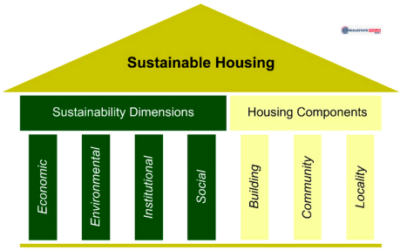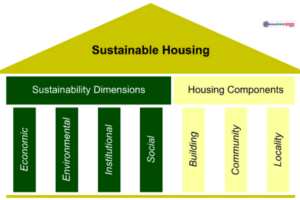

The Importance of Green Certifications and Sustainability in India’s Real Estate Market
Green certifications are increasingly important in the Indian real estate market due to their contribution to sustainability. Buildings that earn certifications like LEED and GRIHA must meet specific environmental standards, which often include energy efficiency, water conservation, waste management, and the use of sustainable materials.
These certifications help minimize the environmental impact of buildings, ensuring that they are in line with global efforts to combat climate change and other environmental issues. With India facing challenges like air pollution, water shortages, and waste management, green certifications present an effective way for the real estate sector to address these concerns and contribute to a more sustainable future.
In addition to the environmental benefits, green-certified buildings often lead to significant financial savings for owners and tenants. For example, energy-efficient buildings consume less electricity, while water-saving technologies reduce water consumption. These savings directly translate into lower utility costs for those living or working in these buildings.
Furthermore, buildings with green certifications are designed with better ventilation, more natural light, and improved indoor air quality, which can lead to a healthier and more comfortable living or working environment. As a result, green buildings not only have lower operational costs but also attract tenants who value sustainability.
The Indian government plays an essential role in promoting green building practices through incentives and regulations. Policies like the Energy Conservation Building Code (ECBC) and various tax benefits encourage developers to design energy-efficient buildings. As the government continues to push for sustainable development, green certifications provide a way for builders to align with these policies.
Moreover, they help real estate companies comply with environmental laws, avoid penalties, and improve their marketability. In turn, developers are more motivated to invest in green buildings as a way to stay competitive in the rapidly growing Indian real estate market.
The demand for green-certified buildings is also driven by evolving consumer preferences. Increasingly, buyers and tenants are looking for properties that offer environmental benefits, such as energy savings and healthier living conditions.
Millennials and Generation Z, in particular, tend to prioritize sustainability in their purchasing decisions, and real estate developers are recognizing the importance of meeting these expectations. In response to this demand, many developers are incorporating green building designs into their projects, not only to appeal to consumers but also to stand out in a competitive market.
As green certifications become more widespread, the real estate industry is likely to see more innovation in sustainable building practices. This includes advances in technology and materials that further reduce environmental impact.
For example, solar panels, energy-efficient HVAC systems, and smart building technologies are increasingly being integrated into green-certified buildings. These innovations contribute to the creation of buildings that are not only environmentally friendly but also technologically advanced, providing residents and businesses with added value.
The real estate sector’s commitment to sustainability is also reflected in the growing number of green-certified buildings in India. According to reports, the number of green buildings in India has steadily increased over the past decade, with many developers incorporating sustainable practices into their projects.
This trend is expected to continue as more stakeholders in the industry recognize the long-term benefits of green buildings. These buildings are not only good for the environment but also for the economy, as they create jobs in construction, renewable energy, and other related industries.
Investors are also starting to recognize the potential of green-certified buildings as profitable assets. Sustainable buildings are often seen as safer investments because they tend to have lower operating costs, are less prone to environmental risks, and attract tenants willing to pay a premium for eco-friendly spaces.
As environmental, social, and governance (ESG) investing becomes more popular, green-certified real estate is increasingly seen as a smart investment. This growing interest from investors further supports the demand for green buildings and contributes to the overall growth of the sustainable real estate market in India.
The growing popularity of green certifications in India also reflects a broader global trend toward sustainability. As more countries adopt green building standards and regulations, India’s real estate market is following suit. This shift is helping to create a more sustainable urban landscape, where buildings contribute to environmental protection rather than detract from it. As the country moves toward more sustainable development, green certifications will play an essential role in shaping the future of Indian real estate.
Moreover, green certifications can also help improve the social impact of real estate projects. Sustainable buildings are often designed with the well-being of occupants in mind, providing healthier and more comfortable living and working environments.
This focus on occupant health and comfort can improve quality of life and increase productivity in commercial spaces. Additionally, the increased availability of green buildings can lead to more sustainable urban development, with fewer environmental problems like air pollution, water waste, and energy overconsumption.
In sum, green certifications are playing a crucial role in shaping the future of the Indian real estate market. They support sustainability by reducing environmental impacts, saving energy, and improving the quality of life for residents and workers.
As government regulations continue to emphasize sustainability and as consumer demand for eco-friendly spaces grows, the role of green certifications in the Indian real estate sector will only become more significant. Developers, investors, and consumers alike are recognizing the long-term value of green buildings, making them a key component of India’s real estate future.




































